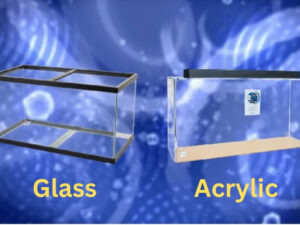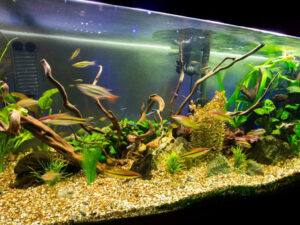Fish are often seen during the summer months in garden ponds, rivers, and open cold water. The stereotypical image of a fish is that it can swim without stopping whilst breathing through gills. This isn’t always true.
The question “Can fish drown?” may seem straightforward, but it’s actually not as simple as you might think.
Most people assume that fish would not drown since they live underwater. It might be surprising to hear that even fish can die due to the lack of oxygen. Not being able to breathe air means that, whilst in water, a fish constantly needs access to oxygen.
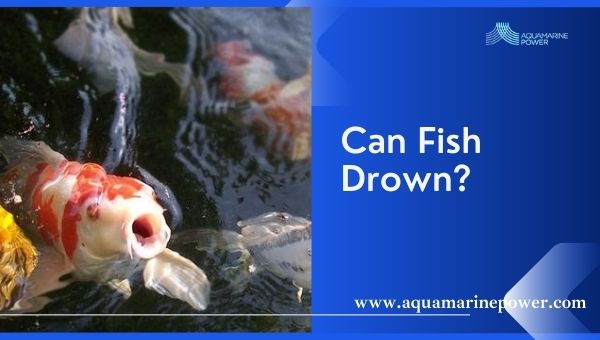
Fish have evolved gills for this very purpose – they extract dissolved oxygen from the surrounding water and use it in respiration just like humans do with their lungs. In fact, without gills, a fish would not be able to breathe and would eventually die.
Table of Contents
How Breathing Functionality of Fish Works?
When we think about breathing, we tend to assume that it is an active process – we breathe in and our bodies do the rest. In reality, however, both inhalation and exhalation require effort from our respiratory muscles.
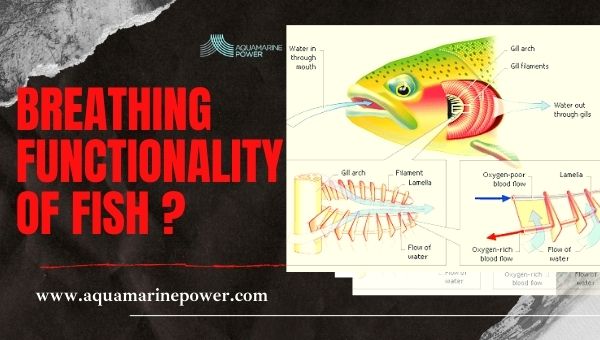
Fish use a similar method to achieve respiration – they drive water into the mouth and over the gills by actively swimming. The amount of oxygen that a fish can extract from this process relates to how fast it swims – the faster it swims, the more oxygen it gets.
As a result, fish have evolved to have optimal swimming speeds. If they move too quickly, water doesn’t flow over their gills optimally and they get less oxygen; if they move too slowly, they risk not getting enough.
Breathing Organs of Fish
The organs used by fish for breathing are called “Gills”
The Gills are located within the throat part of the fish. They have Book Lungs too, which are used for breathing in Oxygen when they come out of water.
By now you must be wondering that if a fish can drown then why aren’t they seen on land gasping for air, right?
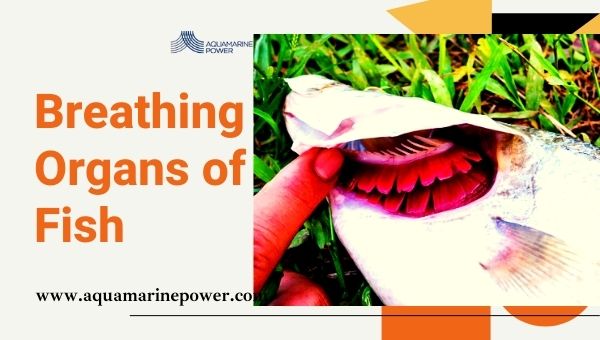
You must be wondering that if a fish can drown then why aren’t they seen on land gasping for air, right? The answer to this question lies in the type of gills a fish possesses. Gills allow a fish to extract dissolved oxygen from water and use it in respiration.
However, unlike lungs, they can’t extract oxygen from the air. This is a blessing and a curse for fish – because their gills only allow them to breathe in the water, not out of it, they cannot drown. On the other hand, it means that they need to stay in water at all times or else risk suffocation.
Uptake of Oxygen Through Breathing Organs
The process by which fish breathe is called “Uptake”.The uptake of oxygen happens through the gills. Oxygen moves from an area of higher concentration to a lower concentration.
The formula for Uptake rate = (Surface Area) *(Concentration Difference between water and air) *(Respiration Rate)
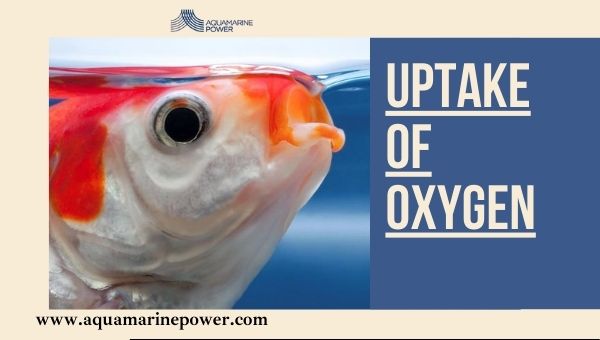
The surface area is constant for all fishes and so is the water’s concentration of oxygen. This leaves only the respiratory rate as a factor that governs the speed at which uptake occurs and hence, how much time a fish can spend out of the water before it suffocates.
Fish breathe through their gills, which extract oxygen from the water that passes over them.
Respiration Rate = (Surface Area) *(Concentration Difference between water and air) Therefore, respiratory rate depends on the size of the fish.
Thus, smaller fish can stay out of water for a lesser amount of time than larger ones since it takes a shorter time to extract the same amount of oxygen from a smaller volume of water.
For instance, a fish that can extract twice as much oxygen from a given volume of air would only need half the time to absorb all the oxygen compared to another species with a lower respiratory rate.
Why it is Difficult for a Fish to Breathe Out of Water?
It is difficult for a fish to breathe out of water because it cannot extract oxygen from the air. It only extracts oxygen from the surface area in contact with its gills which is not possible when it’s out of water.
Fish also need to overcome the problem of water stress which happens due to a difference in pressure between the environment inside the mouth and that outside. The water molecules are under greater pressure inside its mouth than they are outside of it.
As a result, when a fish is out of the water, the pressure difference causes the fish to fill up with water and this causes suffocation.
Since smaller fish take a lesser time to absorb all the oxygen in comparison to bigger ones, they can stay out of water for shorter periods of time.
A fish would only need half the time to extract twice as much oxygen from a given volume of air (compared to another species with a lower respiratory rate). The fish’s ability to extract oxygen from water is similar to birds’ ability when compared with breathing out of water.
Can Fish Survive in 2mg/L of Dissolved Oxygen in Water?
Water is saturated with oxygen at 20°C at a depth between 1-5 meters, depending on the temperature. If the concentration of O2 falls below this level it will not be enough for fish to survive.
It is not true that fish breathe through their gills. Fishes breathe with their lungs also. When fishes are out of the water they suffocate due to lack of availability of oxygen, because the concentration of oxygen in the air is less than that of dissolved oxygen in the water.
The rate at which a fish extracts dissolved oxygen depends on the area of contact of gills with dissolved oxygen.
When a fish is out of the water, the area of contact between water and air reduces due to which it takes more time for a fish to extract a sufficient amount of oxygen from the surrounding atmosphere. This leads to suffocation and death of fishes if they are kept out of water for too long.
Fish cannot survive on dry land for too long. The size of a fish also matters when it comes to the time limit. Larger fish take more time to absorb the oxygen compared to smaller fish. Hence, larger fish can survive out of water for longer periods of time than smaller ones.
Fish suffocates due to a lack of available oxygen in the air if they are kept out of water for too long. The time limit is inversely proportional to the size of a fish, larger fishes can survive out of water for longer periods compared to smaller ones.
Oxygen Depletion Effects on Fish
Oxygen depletion can cause death to the fish; it can also reduce reproduction rate and growth in fish, change the behavior pattern of fish.
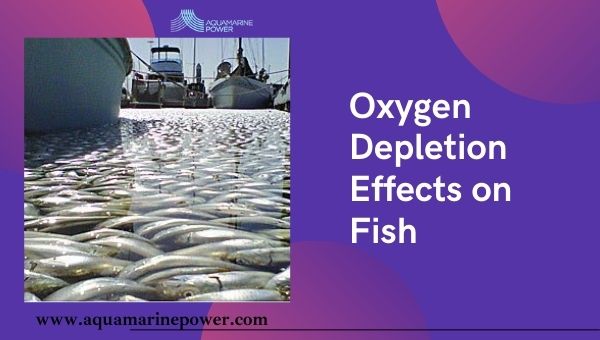
Oxygen-depleted water can also increase disease prevalence which may lead to fish kills. Fish gets suffocated because lack of oxygen supply to respiratory surfaces.
In the early days, the term ‘suffocating’ was used with reference to the death of fishes in water but later on, due to advancements in science and technology, it is known that lack of oxygen causes fish deaths.
Oxygen depletion causes death to the fish; it can also reduce reproduction rate and growth in fish, change the behavior pattern of fish. Oxygen-depleted water can also increase disease prevalence which may lead to fish kills.
Can Fish Drown Due Low Level of Oxygen in Water!
Fish need to extract oxygen from water and this is achieved by contact with the surface area of the gills. This also means that it needs access to a large enough area of water such that it can exchange oxygen at a fast rate.
Fish breathe using their gills, where oxygen is extracted from water that passes over them. The concentration of oxygen in the water depends on the area of contact between water and air. The higher this area is, the greater will be the rate at which oxygen dissolves into the fish’s body.
Any object obstructs this surface area: for instance, long-haired carp or other fishes that swim in schools near to each other and so do not leave enough space for oxygen to dissolve into the water.
This can lead to poor levels of dissolved oxygen in the water. This is called hypoxia and it is dangerous because if it gets really bad, fish start dying.
Causes Of Low Level of Oxygen in Water
This Can Happen Due to several reasons:
Natural Causes Such as Algae Bloom
Algae blooms can reduce the concentration of dissolved oxygen and this is called hypoxia (low levels of oxygen).
Water Flow
If water is continuously flowing out of the pond at a rate that equals the flow coming in, this means that there will be no water accumulating in the pond and so there may not be sufficient oxygen available for fish to breathe.
Pollution
The pollutants in water decrease the oxygen level in the water and can also enter the body of the fish and affect their body which can increase the number of fish kills.
This includes oil spills and chemical waste from factories, treated sewage water, etc. This reduces the level of dissolved oxygen in the water which will lead to fish kills. Fish Kills are events where large numbers of fish die due to suffocation.
Loss of Vegetation
This is because the roots of underwater plants absorb oxygen to carry out photosynthesis. So when you lose the vegetation in the water, it reduces the level of dissolved oxygen in the water which can lead to fish kills.
Overcrowding
The fish gets suffocated because of overcrowding in the pond.
Temperature
Fish need particular temperature ranges within which they can survive and if this is not maintained, they can die because of poor health.
Fish Diseases
These include parasites and other pathological organisms which can affect the fish’s gills and lower their ability to take up oxygen from water. This could cause fish kills by preventing fish from breathing properly.
Fish Age
Fish suffer from suffocation more as they age because they require higher levels of oxygen. So, fish can suffocate in 1-3 days depending on their age.
Acid Rain
Due to acid rain, the oxygen level decreases, and the harmful chemicals increase the rate of fish kills.
Wrong Management
If proper care is taken then fish may not die due to suffocation, but if proper measures are not taken by the owner or person who takes care of the fish, they will face many problems and may die due to suffocation.
Traveling
Fish can travel up to a certain distance and then they will stop because of lack of oxygen, which is called fish suffocation.
Overfeeding
Too much food may lead to the accumulation of waste products in the pond which reduces the dissolved oxygen level. These reasons can lead to poor levels of dissolved oxygen in the water.
Conclusion
Fish have evolved optimal swimming speeds for their particular habitat. If they are moved to an environment where this speed is sub-optimal, they are at risk of suffocating. This has been seen in many studies – fish can die due to being unable to maintain sufficient levels of oxygen absorbed by the gills.
As can be seen, the answer to the question of whether fish breathe oxygen is complicated. The complexities involved are largely due to how fish are adapted to their environment.
The complexity lies in understanding that fish need a certain speed in order to stay alive and this speed is dependent on many factors such as habitat, water temperature, etc which ultimately affect the amount of oxygen a fish can absorb. If a fish is unable to stay at the optimal speed, it will suffocate and die.
In this way, it can be said that fish need oxygen but also need to maintain an optimum level of water flow over their gills in order to breathe correctly.
So now we understand that it’s our job to provide an environment safer for the fish to survive with sufficient oxygen levels otherwise they might die due to lack of oxygen.


